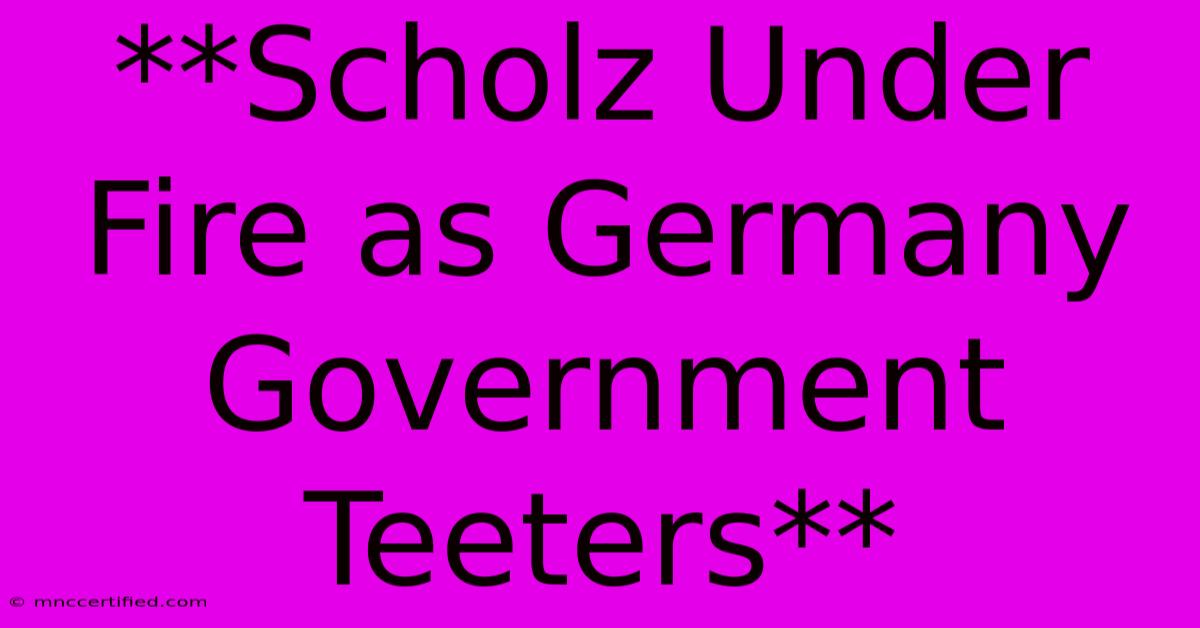**Scholz Under Fire As Germany Government Teeters**

Table of Contents
Scholz Under Fire as Germany Government Teeters on the Brink
Germany's Chancellor Olaf Scholz is facing growing pressure as his government teeters on the brink of collapse, fueled by a series of controversies and internal disagreements. The once-stable coalition government, formed by the Social Democratic Party (SPD), the Green Party, and the Free Democratic Party (FDP), is now plagued by infighting, leaving its future uncertain.
A Series of Controversies
The current turmoil can be traced back to a series of controversies that have shaken public confidence in the government's ability to govern effectively.
- The "Cum-Ex" Scandal: Scholz himself has come under scrutiny for his handling of the "Cum-Ex" scandal, a complex financial scheme that allegedly defrauded the German government of billions of euros. While Scholz insists he was not personally involved, his critics accuse him of being aware of the scandal and failing to take action.
- The "Panama Papers" Revelation: The revelation that German Finance Minister Christian Lindner (FDP) held a Panama-based offshore company raised questions about transparency and accountability within the government.
- The "Inflation Crisis": Germany, like many other countries, is struggling with rising inflation. The government has faced criticism for its perceived lack of action to address the issue, leaving citizens feeling increasingly burdened by the rising cost of living.
- The "War in Ukraine": Germany's response to the war in Ukraine has been criticized by some for being too slow and hesitant. Questions have arisen regarding the country's reliance on Russian energy and its commitment to providing military support to Ukraine.
Internal Disagreements
Beyond the controversies, deep divisions within the coalition government itself are further exacerbating the crisis. The three parties hold vastly different views on a range of crucial issues, including:
- Energy Policy: The Greens push for a rapid transition to renewable energy, while the FDP advocates for a more gradual approach and a continued reliance on nuclear power.
- Fiscal Policy: The SPD favors increased social spending, while the FDP emphasizes fiscal responsibility and limiting government intervention in the economy.
- Defense Spending: The Greens prioritize diplomacy and non-military solutions, while the FDP and the SPD are calling for increased military spending.
These fundamental differences have led to a series of high-profile disputes, making it increasingly difficult for the coalition to reach consensus on key policy decisions.
A Looming Election?
With the government struggling to find common ground, calls for early elections are growing louder. Some politicians, particularly those from opposition parties, argue that the current coalition has lost its legitimacy and that new elections are the only way to restore public trust.
However, others believe that early elections would be a risky move, potentially leading to further political instability and uncertainty. The SPD, in particular, seems reluctant to go to the polls, fearing that a loss could further damage the party's reputation.
The Future of the Coalition
The fate of the German government remains uncertain. While the coalition partners have vowed to continue working together, the ongoing controversies and deep divisions suggest that the government's future is fragile.
The coming months will be crucial for Scholz and his coalition partners. They must address the public's concerns, find common ground on key policy issues, and demonstrate their ability to govern effectively. Failure to do so could lead to the collapse of the government and early elections, with potentially far-reaching consequences for Germany's political landscape.
Keywords: Scholz, Germany, government, coalition, crisis, controversies, Cum-Ex scandal, Panama Papers, inflation, war in Ukraine, internal disagreements, energy policy, fiscal policy, defense spending, election, future, stability, politics.

Thank you for visiting our website wich cover about **Scholz Under Fire As Germany Government Teeters**. We hope the information provided has been useful to you. Feel free to contact us if you have any questions or need further assistance. See you next time and dont miss to bookmark.
Featured Posts
-
Chelsea Vs Fc Noah Live Conference League Stream
Nov 08, 2024
-
The Day Of The Jackal Show Vs Book Analysis
Nov 08, 2024
-
Hamas Armed Struggle Uk Doctors Support
Nov 08, 2024
-
Outer Banks Cast Reacts To Event News
Nov 08, 2024
-
Mark Robins Sacked Coventry Citys Decision
Nov 08, 2024